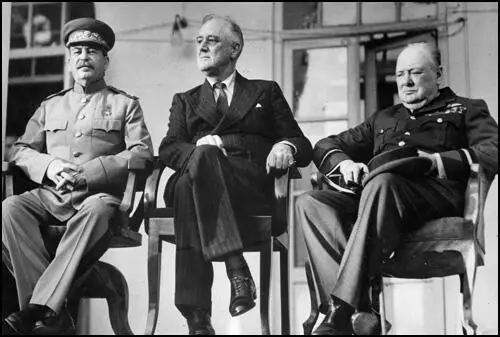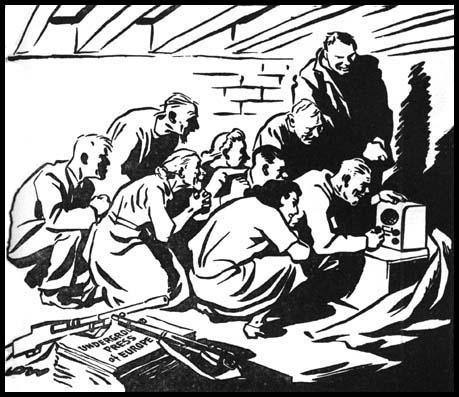Teheran Conference
In November, 1943, Joseph Stalin, Winston Churchill and Franklin D. Roosevelt met together in Teheran, Iran, to discuss military strategy and post-war Europe. Ever since the Soviet Union had entered the war, Stalin had been demanding that the Allies open-up a second front in Europe. Churchill and Roosevelt argued that any attempt to land troops in Western Europe would result in heavy casualties. Until the Soviet's victory at Stalingrad in January, 1943, Stalin had feared that without a second front, Germany would defeat them.

Stalin, who always favoured in offensive strategy, believed that there were political, as well as military reasons for the Allies' failure to open up a second front in Europe. Stalin was still highly suspicious of Winston Churchill and Franklin D. Roosevelt and was worried about them signing a peace agreement with Adolf Hitler. The foreign policies of the capitalist countries since the October Revolution had convinced Stalin that their main objective was the destruction of the communist system in the Soviet Union. Stalin was fully aware that if Britain and the USA withdrew from the war, the Red Army would have great difficulty in dealing with Germany on its own.
At Teheran, Joseph Stalin reminded Churchill and Roosevelt of a previous promise of landing troops in Western Europe in 1942. Later they postponed it to the spring of 1943. Stalin complained that it was now November and there was still no sign of an allied invasion of France. After lengthy discussions it was agreed that the Allies would mount a major offensive in the spring of 1944.

From the memoirs published by those who took part in the negotiations in Teheran, it would appear that Stalin dominated the conference. Alan Brook, chief of the British General Staff, was later to say: "I rapidly grew to appreciate the fact that he had a military brain of the very highest calibre. Never once in any of his statements did he make any strategic error, nor did he ever fail to appreciate all the implications of a situation with a quick and unerring eye. In this respect he stood out compared with Roosevelt and Churchill."
The D-Day landings in June, 1944 took the pressure off the Red Army and from that date they made steady progress into territory held by Germany. Country after country fell to Soviet forces. Winston Churchill became concerned about the spread of Soviet power and visited Moscow in October, 1944. Churchill agreed with Joseph Stalin that Rumania and Bulgaria should be under "Soviet influence" but argued that Yugoslavia and Hungary should be shared equally amongst them.

